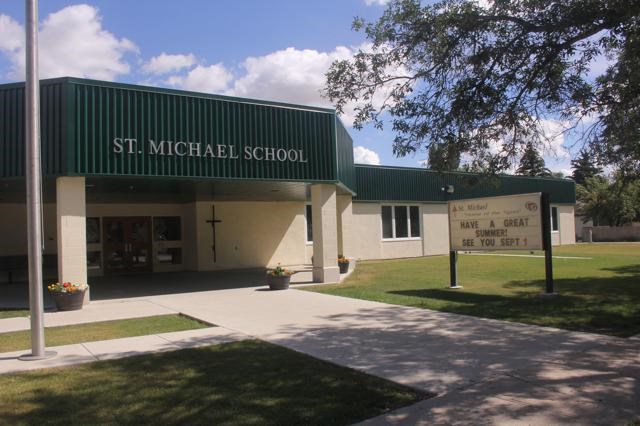By Greg Nikkel
Preliminary enrolment figures for the Holy Family Roman Catholic Separate School Division shows an overall increase of 13 students as of Sept. 6 from June, trustees were informed at their first monthly meeting of the new school year on Wednesday evening.
St. Michael School in Weyburn was the only school to see a decline in enrolment of 19 students, with the move of junior high grades to the Weyburn Comprehensive School cited as a factor.
The Grade 8 and 9 class decreased from 49 to 33 students, and surveys conducted in the spring noted that eight students were leaving to attend the Comp, and six were undecided at the time. St. Michael reported that a number of families have moved from the community as well.
Of the other schools, St. Olivier in Radville gained 11 students, St. Mary’s gained seven, Sacred Heart gained 10, St. Augustine in Wilcox has had no change, and there are four more home-based students.
Education director Gwen Keith pointed out the official enrolment figures that the Ministry of Education use will be as of Sept. 30, and enrolment numbers may change by that time.
The board of trustees met with Estevan MLA Lori Carr at the meeting, and shared a number of concerns with her, including quizzing her about what “transformational change” is about, as the Education ministry has mentioned is a coming priority for school divisions.
Carr admitted she didn’t know what the term refers to, and said she probably won’t know until the Legislature is back in session on Oct. 19.
“With ‘transformational change’, we don’t know what the communication will be on that,” said Keith.
Asked if they had made any inquiries to the ministry about what this change refers to, board chair Bruno Tuchscherer said, “We don’t know to who. We don’t know what we’re reacting to, because we don’t know what it is.”
Keith voiced concerns of the board that the province might look at merging school boards to make them even bigger than they are right now.
“Because we’re little, we understand what the needs are. If we had to be merged with a larger organization, that would be lost. We have a personal relationship with our people, as opposed to just being numbers in a large division. It’s something we’d like to keep intact,” said Keith.
“I can see why you would,” responded Carr.
shared another concern, namely that Holy Family found out late they would be getting less money to operate with from the province, after their budget had been set.
“It makes it difficult to make a budget. We’re working with less money than we were when we set the budget,” he said.
Carr responded by pointing out that a possible reason for this late notification was the late date of the provincial election in the spring, and said of the tight dollars, “It’s something everybody is feeling across all departments, as they’re being asked to do more with less. We’ve had no tax increase and some taxes decreased.”
She added that seniors and young families also saw some increases to benefits, and pointed out, “There’s no rainy-day fund, and oil is still at $45 a barrel. Also, potash isn’t our friend right now.”
In other business, trustees were told more details about the new independent regulatory board that will oversee the disciplining of teachers in Saskatchewan, independent of both the Saskatchewan Teachers Federation and the school divisions who employ the teachers.
Some concerns were voiced about the regulatory board, including that while the Ministry is paying the teachers’ fees this year, next year any teacher with a teaching certificate will have to pay, and the question is whether the school divisions will pay the fees on their behalf.
Tuchscherer noted that nurses have a regulatory agency but the health regions pay any expenses related to the agency’s operation.
A bigger concern is that school-community councils are being asked to comment on the competency of teachers, with trustees pointing out that this is not proper as parents are not qualified to make judgements on a given teacher’s competency or ability to teach.
“They want public input on what teachers should be doing. That’s scary,” said Tuchscherer, pointing out that a parent who has a problem with a teacher could go to a board “and make trouble for them”.




